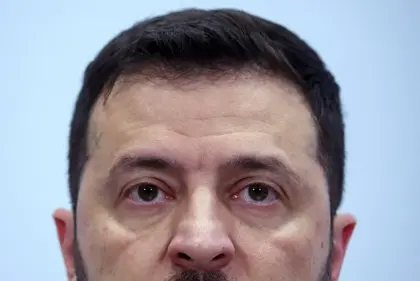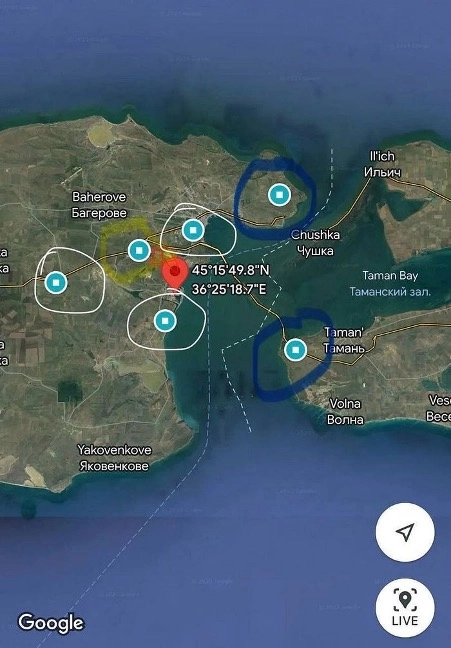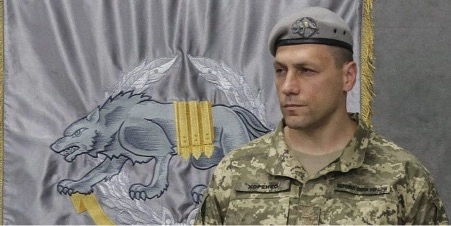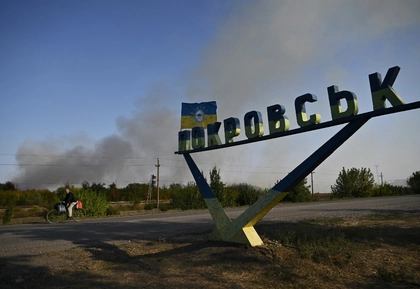Kyiv Post Defense Correspondent Stefan Korshak offers his view of the latest battlefield developments..
Unlucky 128th is unlucky again
In the Zaporizhzhia region the Russian air force struck, with what is believed to have been a Russian Iksander surface-to-surface missile, what appears to have been an outdoor awards ceremony being held by Ukraine’s 128th Mountain Assault Brigade.
JOIN US ON TELEGRAM
Follow our coverage of the war on the @Kyivpost_official.
The latest information suggests that around 20 troops were killed and many more were wounded.
This took place about 20 kilometers (~12.4 miles) from the front line. Normally strikes such as this are pre-planned and authorized at high levels. It suggests, therefore, that either the Russians had substantial prior warning of the awards ceremony, or, less likely, that the Russians are now able to rapidly engage “targets of opportunity.”
The 128th is mainly recruited from the west of Ukraine’s multi-ethnic Zakarpattia region, which has more than its fair share of bad luck. During the period 2014–2021 its leaders fell out with Kyiv, not least because at the Battle of Debaltseve in 2014.
The 128th felt abandoned as the Ukrainian army withdrew to avoid being encircled and the brigade became a de-facto rear guard suffering between 150–200 dead.
According to recent reports, the 128th had been performing reasonably well in recent months in fighting in Zaporizhzhia sector, mostly at the east end of the Dnipro Reservoir around the town of Vasylivka.
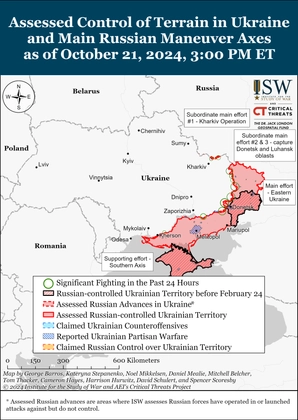
ISW Russian Offensive Campaign Assessment, October, 22, 2024
At the weekend Ukraine’s Defense Minister, Rustem Umerov, went in front of cameras to comment on the missile attack. He said the government was aware of the disaster and that a criminal investigation had begun. The implication of his statement, is that the 128th has a security leak and that its leadership was negligent in putting its troops at risk.
It may also be significant that Umerov, a civilian, was the official that confirmed the failure rather than army commander Valery Zaluzhny. More speculation on the importance of that below.
You know, these expensive NATO long-range anti-ship missiles really do seem to work
Reports in the Western media say there was a Ukrainian missile strike on a shipyard in Russian-occupied Kerch yesterday, in which at least two weapons hit a Russian frigate and started a fire that took more than six hours to extinguish.
The Kremlin’s version of events was that Ukraine had launched 15 missiles, of which Russia’s mighty air defense forces had shot down 13, and that a single ship was “damaged.” This would be more credible if we ignore the first official statement from Crimea’s occupation authorities immediately after the attack that “All Ukrainian missiles were shot down but debris from one of them happened to fall in the vicinity of a dry dock, but no one was hurt.”
It seems very likely that the target was a guided-missile frigate armed with Kalibr cruise missiles that was under construction and about 90–95 percent complete when the missiles hit.
Ukraine says they had fired Storm Shadow/Scalp cruise missiles from Soviet-era Su-24 bombers retrofitted to launch the NATO weapons.
If you examine an open-source graphic that depicts where the Russians have supposedly deployed S-400 air defenses close to the Kerch shipyard and the Kerch bridge, it becomes clear that Ukraine can deliver multiple precision-guided missiles on targets that defeat the very best air defenses the Russian military can muster.
Excellent drawing of where the Russian S-400 anti-aircraft missiles are around Kerch. Not confirmed but the best rendition I’ve seen. The point to this image is that at the red marker, that’s where the Ukrainian missile flew in and blew up a russian warship.
The implication is the Kerch bridge is still standing only because the Ukrainians judge it’s not time to take it down, with its fate being no longer something Moscow can decide. Whether it continues to stand or fall is out of their hands.
Videos taken and local accounts of the missile attack seem to confirm that two Scalps were indeed shot down, but, at least two good hits are very widely confirmed.
Sturm und Drang on the media front: Zelensky is probably really mad but really he can only blame himself
There has been all manner of information warfare and narrative posturing on Ukraine’s part in this past week much of it hasn’t worked out so well for the Zelensky team.
First up was an article in TIME magazine, which included some direct quotes from Zelensky in which he came across as tired and increasingly irritated with a lack of enthusiasm from the West to continue backing the Ukrainian war effort. Zelensky’s only answer appears to be to try harder, and that’s why he’s grumpy and depressed, the article said.
The byline on the TIME report, was Simon Shuster, who said he had interviewed Zelensky directly as well as having spoken with several (anonymous) members of the administration during a two-week visit to Kyiv. It’s not clear from the article exactly how many sources Shuster talked to but, on reading the article it appears to have been as many as six.
While I’ve no particular axe to grind with Shuster or TIME magazine and I don’t have coffee with Zelensky, I have found that TIME, like many publications outside of Ukraine, are often inaccurate in their reports on Ukraine. I think the report has got many of the details on the situation as well as how Zelensky and the Ukrainian national leadership sees the war, at least somewhat wrong.
Through my contact with Ukrainian politicians and the military, over the last twenty months, my assessment is that the Zelensky team right now thinks they are slowly winning a war of attrition and that in the final analysis Ukraine and the Ukrainians will outlast Russia, because it’s their country.
They point to accumulating Russian casualties, materiel and equipment losses and point out that the Ukrainians will keep fighting until the scale of these losses changes Russian behavior – in the same vein as Afghanistan and Vietnam. They are frustrated that Western assistance is slower than they would like because that slows the rate at which Russia will become exhausted and depart.
TIME magazine seems to see the situation and the mindset of Zelensky and his administration differently.
From Ukraine’s perspective, the article’s content and timing caused serious problems. Firstly because the US Congress is in the process of reviewing/planning for further Ukrainian military assistance and saying Zelensky is tired and sees no end to the war won’t help that process. Secondly, because it undermines public morale in Ukraine and, thereby, the war effort. Thirdly, because if there are Presidential elections in Ukraine next year, a war-weary Zelensky might be vulnerable to an opposition candidate pushing the “fresh-blood” ticket.
It seems in giving the interview to TIME, Zelensky and his media managers assumed it would be a positive piece – given that TIME had named him Man of the Year less than a year ago. Clearly, Shuster had other ideas and was more than happy to seek out those who were willing to be more negative about the war than Zelensky is in official statements.
Zelensky seems to be surprised and is no doubt livid with the coverage. He is a smart guy who is confident in his ability to get his message across and is unlikely to have just told the simple truth to TIME or anyone else.
A terrific communicator seeing the messaging he hoped to give when he had set up the session would make anyone mad, let alone someone under the significant pressure of running a country invaded by Russia. Zelensky’s frustration levels must be off the scale.
Even worse for a nation critically dependent on foreign aid subject to the intricacies of US domestic politics, there is an article out there that directly undermines the most basic message he’s been making since day one: Give us the tools and Ukraine will fight, Ukraine won’t quit, Ukraine won’t flag, Ukraine is confident.
There is also the unpleasant problem of dealing with rats in his administration and what to do about them. I’m sure that any official who came into contact with Shuster will be investigated by the SBU – we may soon start to see members of the presidential administration getting sacked.
Two days later, General Valery Zaluzhny, commander of the Ukrainian army, published an article in The Economist magazine, in which he declared Ukraine’s offensive actions were over through a lack of major military technical advances. He categorized the situation to be like WWI, where neither side can advance because defense technologies are too strong.
Before commenting on the messaging and public information aspect, we should note that WWI ended not in stalemate, but maneuver warfare on all fronts and decisive as a result of the development of better tactics and implementation of some new technologies.
For most participants, the collapse of army morale due to crushing casualties came about at the end and it was substantial US materiel intervention that proved decisive – perhaps another historical echo relevant to the war in Ukraine.
As it happens, I’ve been studying Operation Lightfoot – one of the WWII El Alamein battles. It’s striking how it had the same military problems of conducting a deliberate ground assault into strong defenses protected by deep minefields, with the objective of achieving breakthrough.
What Zaluzhny was trying to achieve with The Economist article, is an excellent question. Was he telling Zelensky that he’s done with wasteful attacks and the objectives Kyiv is setting him are impossible and it’s a way of outing Zelensky’s “bad” strategy? Is he considering, as many Ukrainians think, about a run at the Presidency himself? [Ed - Was it aimed at the US give us more better weapons if we’re to win?]
A Zelensky administration spokeswoman suggested clearly on Sunday that the interview was Zaluzhny’s idea and the administration only found out about it by reading The Economist like everyone else.
In such cases, most journalists apply the “cock up or conspiracy” theory, where one or more people in positions of responsibility mess up and then try to shift blame to others using media.
Which brings us to Major General Viktor Khorenko – until yesterday commander of Ukraine’s highly-respected special operations forces (SSO).
Over the last year, he is credited with turning Ukraine’s version of the SAS/Delta into a deadly combat force with all manner of overt and covert, declared and undeclared battlefield successes.
It was extremely shocking that he found out on Thursday that he had been sacked when General Zaluzhny called him up and asked him if he knew he was out of a job, and an hour or two later when he heard about how President Zelensky had sacked him, in news reports.
That evening Khorenko, being interviewed by phone on live television said he had no idea the sacking was coming, that Zaluzhny hadn’t asked for it and was just as surprised by Zelensky’s announcement as he was. It was later claimed by the Presidential administration, that Khorenko hadn’t been fired but had supposedly been selected for some important new military intelligence assignment.
Then on Friday, Zaluzhny’s office announced, in direct contradiction of the previous day's announcements that he had been sacked by Zaluzhny at the President’s request. Was it because it was thought that no one in Ukraine can remember anything past a single news cycle? Maybe Zelensky was past caring.
So what the hell was going on?
My theory is that it was in response to a 48-minute interview by Khorenko, published on YouTube on Halloween by the Special Operations command itself. In it, the general holds forth in some detail about how effective Ukrainian special operations troops are, how much Russian troops fear them, and how he and his guys are, if not winning the war single-handedly, then almost everything they’re doing is great and world-class special ops.
The interviewer was Valerya Karpilenko, who is a veteran of fighting in Mariupol during the Azovstal siege. While this makes her deserving of respect and undoubtedly proves her courage, she is not a journalist.
And there is more to reporting than than sitting down with the boss, smiling a lot, asking some nice questions and nodding pleasantly when he says “that’s secret.”
Major General Viktor Khomenko, at the time of this photograph still the commander of Ukraine’s special operations forces. My best guess is he got sacked for talking too much about secret subjects in a puff-piece interview.
An excellent write-up of all of this by my Kyiv Post colleague Yulia Struck can be found here
It’s a pity that one of Ukraine’s best and most experienced special operators could have stayed silent and published his and his unit’s story once the war was won.
Among the claims made by Khorenko were:
- On-the-ground SSO operators provided targeting information for a Jan. 1 2023 strike on a Russian troop center killing 400 and injuring 200, plus destroying equipment
- Operators provided targeting information and after-action reports for the Oct. 13 Storm Shadow missile strike that took out two Russian warships in Sevastopol
- On-the-ground operators did the same thing for the Oct. 17 Storm Shadow missile strike that leveled Russia’s Black Sea Fleet headquarters in Sevastopol.
- On-the-ground operators were directly involved in UAF strikes against Russian airfields in Saki, Melitopol, Berdyansk and Luhansk.
- Ukrainian SSO troops are still on the ground deep inside Russia
- Ukrainian special forces have carried out sabotage attacks against military production facilities deep inside Russia
- Ukrainian SSO operators are currently carrying out surveillance of Russian factories, in preparation for attacking them
- Ukraine’s SSO level of operations is only limited by its ability to train operators compared with the very large number of targets inside Russia that need to be reconnoitered. If the SSO could expand its operations inside Russia it would.
- Russia might have suspected much of this but for it to be confirmed can only assist the Kremlin’s future planning. Was Khorenko and/or Karpilenko said during the YouTube interview cleared with other Ukrainian agencies, such as the SBU, foreign ministry, regular army or the president’s office, who might just have an opinion on how much information about Ukrainian special operations inside Russian territory should be released to the public?
In most countries, while special operations people like to think of themselves as separate and not subject to the same rules as others, they are generally reluctant to appear in front of a camera without proper supervision, especially during wartime.
My guess is the sequence of events went something like this:
Zelensky thought his TIME interview would paint him as heroic and dauntless, instead of Shuster’s portrayal as a guy that’s cracking under pressure and has been reduced to begging for help.
Forty-eight hours later General Zaluzhny’s self-penned Economist article comes out, which announces to the world Ukraine can’t win until it gets all manner of new weapons, some of which don’t appear to exist, and Russia will keep on occupying large chunks of Ukraine.
Even though it included statements that directly impact Ukrainian diplomatic and foreign relations, Zaluzhny apparently didn’t think it necessary to run it past Zelensky’s office, adding to the President's anger and frustration.
THEN the YouTube interview comes out, where the head of the SSO seems to say he is winning the war against Russia as a result of clandestine operations, particularly inside Russia, that should remain undeclared.
This as it’s implied that the rest of the Ukrainian military is in trouble, which was also not run by anyone – because, special ops guys are special and they don’t like outsiders interfering with what they do. Or checking. Or asking questions.
The vein in Zelensky’s forehead must have been really throbbing by now:
The army is running roughshod over Ukraine’s public message, the special forces are leaking highly sensitive information and don’t seem to care, and his administration’s decision to give unprecedented access to a major US publication has blown up in his face.
Without a scintilla of doubt, any question Zelensky is asking about how this train wreck came about and who is accountable, is being passed from person to person like a hot potato.
In the midst of all the finger-pointing, Zelensky realizes he has neither the time nor energy to sort it out, he has a war to win, so he blows his stack and that’s how Khorenko got fired.
Another theory, by the Ukrainian reporter Yury Butusov, a highly credible commentator, is that Khorenko’s sacking wasn’t this cascade of errors, but rather a calculated retaliation against Zaluzhny for his downbeat Economist article.
I don’t see Zaluzhny as a guy who would try to enter into a public fight with his president. Ukraine’s SSO is an organization that doesn’t have the skills for public messaging. Having watched the entire Khorenko interview all I see is hubris and a huge failure of OPSEC.
I see plain, old-fashioned human error as the main driver of events here.
In any case, it’s been a week of public relations chaos at the top of Ukraine’s government and military leadership. You get this from time to time in democracies at war, but even when you recognize it for what it is it isn’t very pretty.
The views expressed in this opinion article are the author’s and not necessarily those of Kyiv Post.
You can also highlight the text and press Ctrl + Enter


